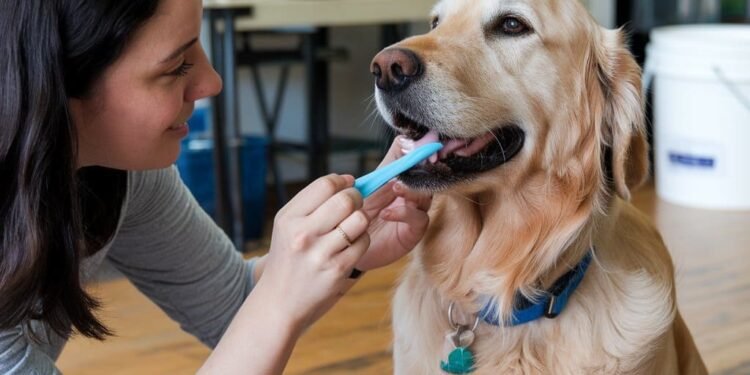Did you know that about 80% of dogs show signs of gum disease by the time they are three years old? This fact comes from the American Veterinary Dental College. It shows how crucial it is to take care of your dog’s teeth. Just like us, dogs need good dental care to stay healthy.
Using dental supplements for dogs is a great way to help them. These supplements are key to keeping your dog’s teeth and overall health in top shape. They help prevent serious health problems later on.
Key Takeaways
- Daily brushing is the most effective method for maintaining dog dental health.
- Several vet-approved dental treats can aid in oral hygiene.
- Products endorsed by the Veterinary Oral Health Council effectively reduce dental disease severity.
- Hard treats that can damage teeth should be avoided.
- PetLab Co. has enhanced the health of over three million dogs.
- Dry kibble is generally better for dental health than canned food.
- Various affordable tools and products are available for maintaining your dog’s oral health.
Table of Contents
The Importance of Dental Health for Dogs
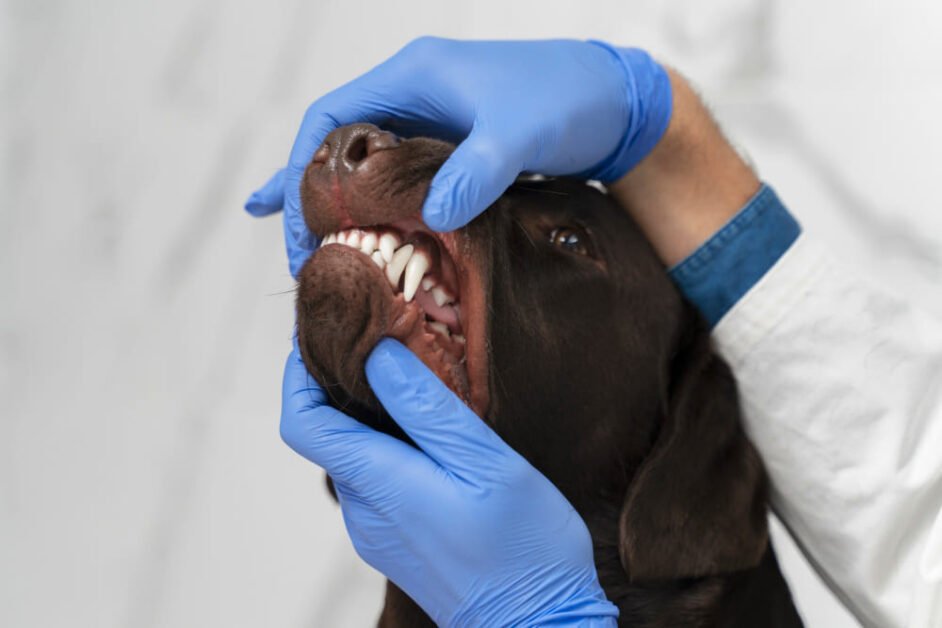
Keeping a dog’s teeth clean is very important. It helps prevent oral diseases that can lead to serious health problems. These infections can affect the mouth, heart, kidneys, and lungs.
Bad breath in dogs is a big warning sign of dental issues. It often means there’s a problem like periodontal disease or rotten teeth. Keeping up with pet dental care helps avoid these risks.
Early signs of dental disease need quick action. Look out for things like yellow or brown tartar, red gums, and bad breath. Brushing your dog’s teeth every day is key to good dental care. This can help avoid the need for professional cleanings.
Adding chew toys to your dog’s routine can also help. These toys can remove plaque as dogs chew. A special diet can also help fight plaque and tartar.
Since 80-89% of dogs over three years old have periodontal disease, it’s crucial to be aware and act. Dental problems are more common in older dogs, especially smaller breeds. A regular teeth cleaning routine can improve your dog’s life and help them live longer.
| Signs of Dental Disease | Importance of Regular Care | Preventative Measures |
|---|---|---|
| Bad breath | Prevents serious health issues | Daily brushing |
| Yellow/brown tartar | Replaces necessity for professional cleanings | Chew toys for scraping |
| Red/swollen gums | Enhances overall well-being | Special diet for dental health |
Understanding Dog Oral Care
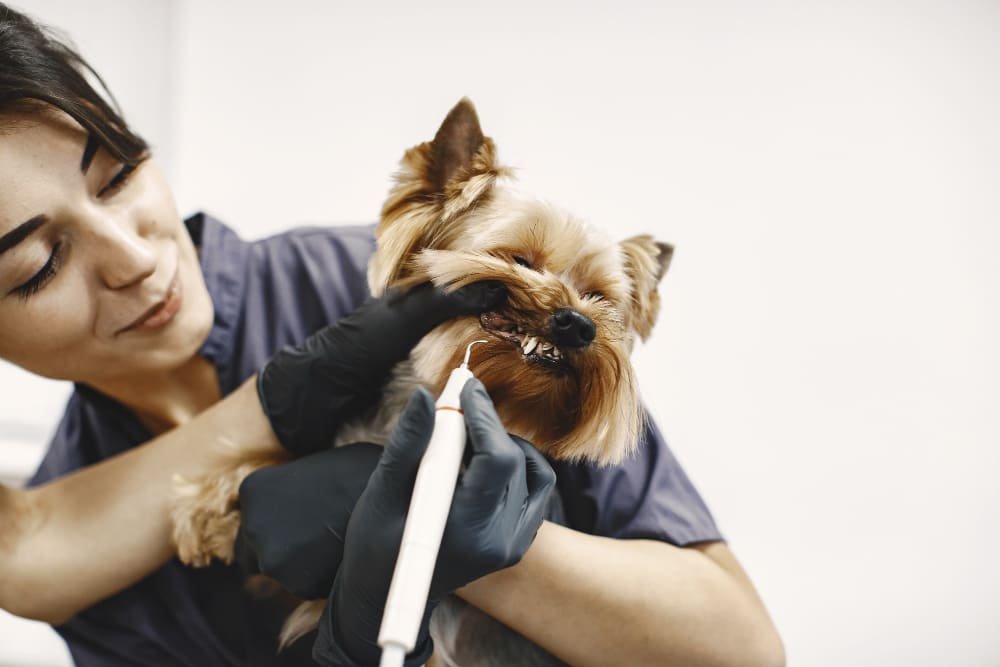
Keeping your dog’s mouth clean is key to their health. By three years old, 80% of dogs show signs of gum disease. This shows how important it is to prevent dental problems early.
Start your dog’s dental care early, even at three months old. Brushing their teeth is a must, ideally two to three times a week. But brushing every day is best. Use toothpaste made for dogs that tastes good to them, like chicken or peanut butter.
Adding dental products to your dog’s routine is important. Try PetFriendly’s Brilliant Dental Care or TropiClean Oral Care Gel. There are also dental treats like AKC Dentacare Dog Treats and Greenies Natural Dental Dog Treats that help fight plaque and tartar.
Dental chews can also help, such as C.E.T. Dental Chews and Nylabone Dura Chews. They keep teeth clean. For dogs who don’t like brushing, dental wipes like Petkin Dog Dental Wipes are a good option. Don’t forget yearly vet check-ups to catch dental problems early.
Natural items can also help with oral care. Carrots, coconut oil, and apple slices can clean teeth and be tasty treats. You can also add dental powders like VetriScience® Perio Support to their food.
A strong focus on oral care can greatly improve your dog’s life. It lowers the risk of dental diseases and shows why regular care is key.
What Are Dental Supplements for Dogs?
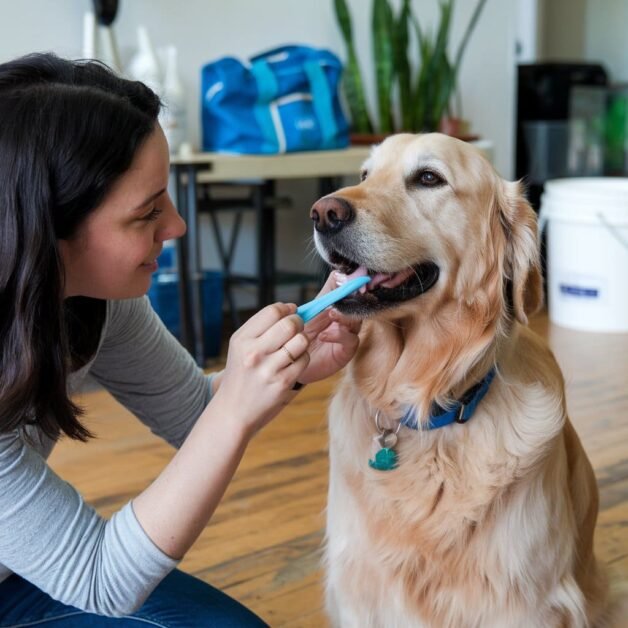
Dental supplements for dogs help keep their mouths healthy and prevent dental problems. They come in different forms like chewable tablets, powders, and water additives. Each type is designed to reduce plaque and tartar and make their breath fresh.
The Nutri-Vet Daily Dental powder is a popular choice. It comes in a 75g pouch that lasts a medium-sized dog about 90 days. This powder is absorbed by the body through the stomach and helps with dental health. The amount given daily depends on the dog’s size, so bigger dogs might use it up faster.
It’s a good idea to talk to a vet before starting any new supplement. This is especially true if your dog is already on other medicines. It makes sure the supplement is safe and right for your pet’s health.
Choosing the right dental product is very important. There are many options available, each with its own benefits. For example, some products start at $14.95, while others are $26.95. Knowing these prices and options helps you make the best choice for your dog.
Adding dental supplements to your dog’s care routine, along with regular brushing, can greatly improve their oral health. Learning about the different supplements helps keep your dog’s smile bright and healthy.
Benefits of Dental Supplements for Dogs
Dental supplements offer many benefits for your dog’s dental health. They make your dog’s breath smell fresher, making time with your pet more pleasant. These supplements also help keep gums healthy and reduce plaque and tartar.
Using dental supplements can mean fewer trips to the vet for cleanings. This saves both time and money for pet owners. Regular use of these supplements is key to keeping your dog’s mouth healthy.
Chewing can cut plaque in dogs by almost 70%. This shows how important it is to use a dog breath freshener that encourages chewing. Making kibble bigger by 50% can lead to a 42% drop in tartar.
Products coated with polyphosphate can cut tartar buildup by another 55%. It’s crucial to pick dental supplements that have a VOHC approval. These products must show at least a 10% drop in plaque or tartar.
Products with chemical anti-plaque agents need to cut plaque or tartar by at least 20% to get VOHC approval. Choosing quality dental supplements helps support your dog’s dental health.
- Daily use recommended for maximum effectiveness
- Subscription discounts available, offering 20% off
- High customer rating at 4.5 on Trustpilot
- Some formulations begin working immediately while others show cumulative benefits over time
Dog Dental Health Issues: Common Problems

It’s crucial to know about dog dental health issues for your pet’s well-being. Over 80% of dogs over three years have dental diseases, like periodontal disease. This starts with gum inflammation and can get worse if ignored.
Look out for signs like bad breath, discolored teeth, or bleeding gums. These mean your dog has dental problems that need quick action. Tooth decay is rare in dogs, but periodontal disease is common in older dogs. It affects more than two-thirds of dogs over three years.
Small breeds with short jaws are more likely to get periodontal disease because of crowded teeth. They need regular dental care to prevent tartar buildup. A vet can help with scaling and polishing to fight gum inflammation and gingivitis.
| Issue | Symptoms | Common Treatment |
|---|---|---|
| Periodontal Disease | Bad breath, bleeding gums, loose teeth | Professional cleaning, home dental care |
| Tooth Fracture | Pain, difficulty chewing, swelling | Extraction or root canal |
| Malocclusion | Abnormal bite, discomfort while eating | Orthodontics or extractions |
Preventing dental problems helps keep your dog’s mouth healthy. Brushing your dog’s teeth regularly, even from a young age, can help. It reduces plaque and lowers the risk of periodontal disease. Always get vet advice for professional cleanings to keep your dog’s mouth healthy for years.
How to Choose the Right Dental Supplement for Your Dog
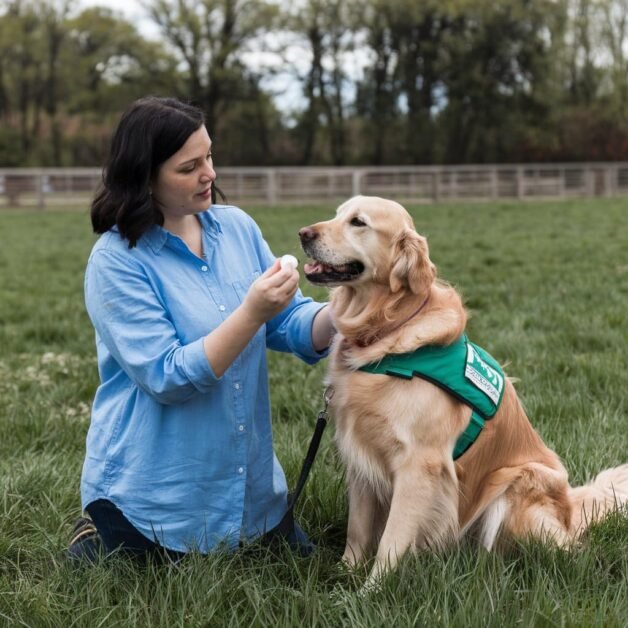
Choosing dental supplements for dogs is important. You need to think about your dog’s size, age, breed, and health issues. About 80% of dogs show signs of dental disease by age three. So, it’s key to act fast to keep your dog healthy.
Talking to a vet can help pick the best product for your dog. This is very important when looking at all the options out there.
Be mindful of your dog’s sensitivity to ingredients and their diet needs. For instance, VEGGIEDENT® FR3SHTM by Virbac helps with bad breath, plaque, and tartar. It also supports digestive health.
Choosing the right size of dental chews is crucial. Chews that are too small can be a choking hazard. Ones that are too big might not work well. Watching your dog eat these products keeps them safe and makes it fun.
- Look for products with Veterinary Oral Health Council (VOHC) approval, indicating proven effectiveness.
- Note that the cleaning action of dental chews contributes up to 90% of their effectiveness. The act of chewing is essential in maintaining dental health.
- For options like Nutri-Vet Daily Dental powder, consider packaging details. A 75g pouch can last a medium-sized dog around 90 days.
The right daily dose depends on your dog’s size. Use a 1/8th teaspoon measuring spoon for the right amount. Most products also have a best by date, usually two years from when they were made. This tells you how long the product is good for.
Making sure your dog likes their dental supplements is important for their health. By choosing wisely, you help them keep their teeth clean and stay healthy.
Types of Dental Supplements Available
Choosing the right types of dental supplements for dogs is key to keeping your pet’s mouth healthy. There are many options out there, each tailored to meet your dog’s specific needs and likes.
Chewable Supplements
Chewable dental treats are a hit with pet owners. They’re not just a tasty snack but also help with dental health. Brands like Whimzees and Greenies have many flavors, including chicken, bacon, and beef. This way, even picky eaters will find something they like.
- Variety of flavors: Options like chicken, bacon, beef, and veggie.
- Specialized products: Available for different age groups and weight categories.
- Unique designs: Features such as raised dental ridges promote effective chewing actions.
Powders and Water Additives
Water additives for dogs are great for boosting dental health. Just mix them into your dog’s water for fresh breath and less plaque. Brands like TropiClean make it easy to add to your pet’s daily routine.
| Type | Form | Average Price Range | Target Users |
|---|---|---|---|
| Chewable Dental Treats | Chews | $1.49 – $41.99 | Puppies, Adults, Seniors |
| Powders and Water Additives | Liquid | $5.99 – $24.99 | All Ages |
Both chewable treats and water additives are easy to use and work well. They’re key for keeping your dog’s teeth healthy.
Key Ingredients to Look for in Dental Supplements
Choosing the best dental supplements for dogs is important. You should focus on the ingredients in dog dental supplements. High-quality supplements can greatly improve your dog’s mouth health. Look for ingredients that have been proven to work well, such as:
- Chlorhexidine: An antibacterial agent known for its effectiveness in reducing calculus, plaque, and gingivitis.
- Sodium hexametaphosphate: A chelation agent that helps prevent tartar buildup.
- Natural extracts: Ingredients like green tea extract can offer additional dental health benefits.
- Rice fibers: These not only reduce plaque mechanically but also promote gut health.
- Probiotics: Essential for regulating the microbiota in the oral cavity and supporting overall health.
Good dental care products often have antioxidants like blueberries and parsley. These help fight oxidative stress, which can lead to mouth problems. Fatty acids from fish oil supplements, including Omega-3, also support healthy gums and prevent mouth issues.
| Ingredient | Function |
|---|---|
| Chlorhexidine | Reduces calculus and plaque |
| Sodium hexametaphosphate | Prevents tartar buildup |
| Probiotics | Boosts gut and immune health |
| Antioxidants (e.g., blueberries) | Combats oxidative stress |
| Rice fibers | Reduces plaque and promotes gut health |
Stay away from products with harmful additives like xylitol or artificial preservatives. Choosing dental supplements with the right ingredients in dog dental supplements is key. It’s important for your dog’s mouth health and overall health.
Dosage Information: Recommended Intake for Dogs
Knowing the right dosage for dog dental supplements is key for good oral health. The amount needed often depends on the dog’s size, weight, and the product type. It’s important to follow the dosage guidelines from the manufacturer. This ensures your dog gets the right amount of nutrients safely.
Most product labels have a recommended intake. They group dogs by weight to set the right dosage. For example:
| Weight Category | Recommended Intake |
|---|---|
| Up to 10 lbs | 1 chewable supplement daily |
| 11 to 25 lbs | 2 chewable supplements daily |
| 26 to 50 lbs | 3 chewable supplements daily |
| 51 lbs and over | 4 chewable supplements daily |
Talking to a vet can give you more advice for your dog’s needs. This is especially true for puppies or older dogs. They might need different amounts of supplements. Watching how your dog reacts to these supplements can help adjust the dosage for their health.
Potential Side Effects of Dental Supplements
Dental supplements for dogs help with oral health but can also have side effects. It’s important for pet owners to know these potential issues. Dogs might experience stomach problems like diarrhea or vomiting, or allergic reactions like skin issues or swelling. Some dogs may also act differently, so it’s key to watch them closely.
When you start a new dental supplement, watch your dog closely. Look for changes in their behavior, how much they eat, or their overall health. If your dog seems sick or uncomfortable, talk to your vet right away. They can tell you if the side effects are normal or if you need to change the treatment.
To help dog owners understand dental supplement side effects, here’s a table:
| Side Effect | Description | Action to Take |
|---|---|---|
| Gastrointestinal Upset | Diarrhea, vomiting, or loss of appetite. | Monitor closely; consult a veterinarian if persistent. |
| Allergic Reactions | Symptoms may include itching, swelling, or difficulty breathing. | Seek immediate veterinary assistance if severe symptoms occur. |
| Behavioral Changes | Unusual lethargy, aggression, or loss of interest in activities. | Monitor for any changes; report to your veterinarian. |
Checking your dog’s health every day helps spot any bad reactions early. Always put your dog’s comfort and health first when choosing dental health products.
Precautions When Using Dental Supplements
Before adding dental supplements to a dog’s diet, it’s key to take some steps. Talking to a vet makes sure the supplement fits the dog’s health and medicines. Every dog is different, so getting veterinary advice is crucial when picking a supplement.
Start with a small amount of the supplement to watch for any bad reactions. This helps figure out if the supplement is safe and right for the dog. Watching how the dog acts during this time is important to avoid any problems.
It’s important to know the risks of some dental products. Some can react badly with other medicines or make health issues worse. So, always talk to a vet before starting any new supplement.
| Supplement Type | Potential Risks | Recommended Actions |
|---|---|---|
| Chewable Supplements | Choking hazard if too small | Choose size-appropriate products |
| Powders and Water Additives | Possible allergic reactions | Introduce slowly, monitor for reactions |
| Dental Chews | Risk of splintering | Avoid cooked or smoked items |
| Homemade Dental Mixes | Ingredient contraindications | Consult vet on ingredients |
Regular vet visits can help make using supplements safer. They give insights into the dog’s mouth health and what it needs to eat. By following these steps, dental supplements can be a big help without harming the dog’s health.
Natural Alternatives and Complementary Therapies
Looking into natural options for your dog’s dental care can be very helpful. Many pet owners now use natural dog dental products to boost their pet’s oral health. Using items from your kitchen or garden can help keep your dog’s teeth clean.
Natural Dog Dental Products
Natural dog dental products can help prevent oral diseases. Here are some top picks:
- Coconut oil: It fights bacteria and cuts down plaque.
- Carrots: These are great for dental health and are a tasty snack.
- Apple slices: They act like a toothbrush, removing tartar and freshening breath.
These natural supplements are good for your dog’s teeth and overall health. Adding them to your dog’s routine can really improve their oral hygiene.
Homemade Dental Care Recipes
For those who want to make their own dental care products, homemade recipes are a great choice. A popular recipe mixes mashed bananas with oatmeal for tasty dental treats. These treats clean teeth and dogs love them. Other recipes include:
- Carrot and peanut butter chews: Easy to make and both healthy and tasty for dogs.
- Sweet potato biscuits: These biscuits clean teeth and are a yummy reward.
- Herbal breath-freshening treats: Ingredients like parsley or mint help keep breath fresh.
Using both natural dog dental products and homemade dental care can greatly improve your dog’s dental health. You’ll save money and feel good about what you’re giving your pet.
| Recipe name | Benefits | Example Ingredients |
|---|---|---|
| Natural Dog Dental care recipe | Supports oral health and freshens breath | Coconut oil, carrots, apple slices |
| Homemade Dental Care recipe | Cost-effective and customizable dental treats | Bananas, oatmeal, peanut butter, sweet potatoes |
Signs of Deficiencies in Dog Dental Health
It’s important to know the signs of dental problems in dogs for their health. Bad breath is a clear sign of dental issues. Other signs include a lot of tartar and inflamed gums. These signs can lead to bigger problems if ignored.
Watching how your dog eats can tell you a lot. If they have trouble chewing or don’t want to eat, they might be in pain. Small breeds often have crowded teeth which makes things worse. The American Veterinary Dental Society says 80% of dogs show dental disease signs by age three.
Seeing your dog for dental check-ups every 6-12 months helps catch problems early. Not getting enough calcium and Vitamin D can make teeth and gums weak. This makes them more likely to get gum disease and cavities.
Spotting dental problems early is key. By watching closely and acting fast, pet owners can keep their dogs’ mouths healthy and their overall health good.
Risks Associated with Poor Oral Care
Poor dental care can lead to serious risks for dogs. Over 80% of dogs over three suffer from dental disease. This shows how important dental health risks are due to bad oral hygiene.
Untreated teeth can get periodontal disease, the top issue in adult dogs. This disease causes inflammation, leading to tooth loss and infections. It’s a big problem for dogs.
The risks of poor dental care in dogs go beyond their mouth. Bacteria from their mouths can get into their bloodstream. This can hurt organs like the heart, liver, and kidneys.
Chronic dental disease can cause serious problems, like heart infections and heart disease. Dogs with dental issues may also have a weaker immune system. This makes them more likely to get infections.
Not taking care of a dog’s teeth can lead to big health problems. Bacteria can affect liver and kidney health and upset the balance of gut bacteria. This can harm a dog’s overall health.
Regular brushing, dental chews, and vet visits are key to preventing these problems. They help keep a dog’s mouth healthy and their life better.
Pet owners need to know that dental diseases can affect a dog’s whole body. Regular dental check-ups and choosing the right food are important. Taking care of a dog’s teeth can help prevent many health issues, making their life longer and healthier.
Cost Considerations for Dental Supplements for Dogs
The cost of dog dental supplements can vary a lot. They range from affordable to premium products. It’s important to think about the long-term benefits of dental care. Regular dental supplements can prevent serious dental problems, which can be very costly.
Professional teeth cleaning costs between $170 to $350. If your dog needs more work, like extractions, it can be up to $4,000. It’s smart to budget for dental check-ups every year or every six months. This is because many dogs get periodontal disease by age three. Look out for bad breath and changes in how they eat.
To save money on dental care, try brushing your dog’s teeth and using dental chews. Using pet toothpaste at home can also help. This can cut down on plaque and reduce the need for expensive vet visits. There are also programs like GoFundMe and CareCredit to help with unexpected vet bills.
| Dental Treatment | Average Cost |
|---|---|
| Professional Teeth Cleaning | $170 – $4,000 |
| Periodontal Disease | $400 – $1,000 |
| Abscessed Teeth | $200 – $500 |
| Root Canal | $200 – $3,000 |
| Tooth Loss | $200 – $500 |
Dental insurance for pets varies a lot by policy. Monthly premiums can be from $15 to $90. It’s important to plan for dental supplements and care to keep your pet healthy and avoid unexpected bills.
Conclusion
Keeping your dog’s teeth clean is key to their overall health. Dental supplements are vital for fighting plaque and tartar. Using dental chews, brushing regularly, and vet check-ups can make a big difference.
Many dental problems don’t show up right away. That’s why regular check-ups are so important. Adding dental supplements to your pet’s routine can prevent serious issues like periodontal disease. This starts early, around age three.
Creating a good dental care routine is crucial. It should include the right dental products and advice from professionals. Taking care of your dog’s teeth means they can live a happier, healthier life with you.
















